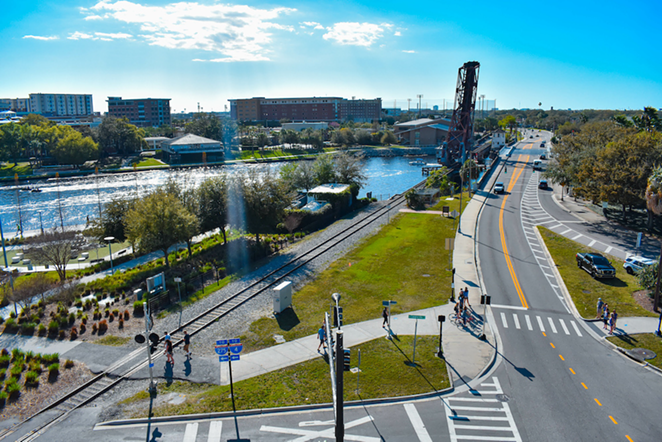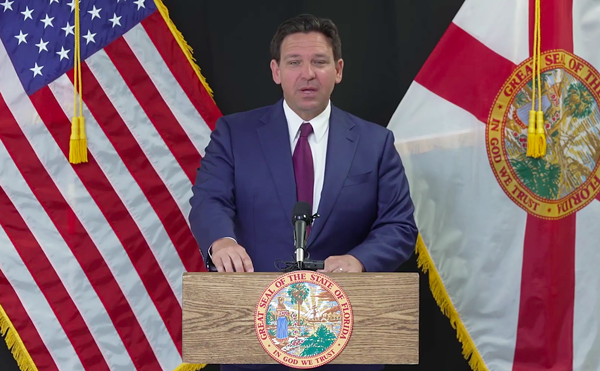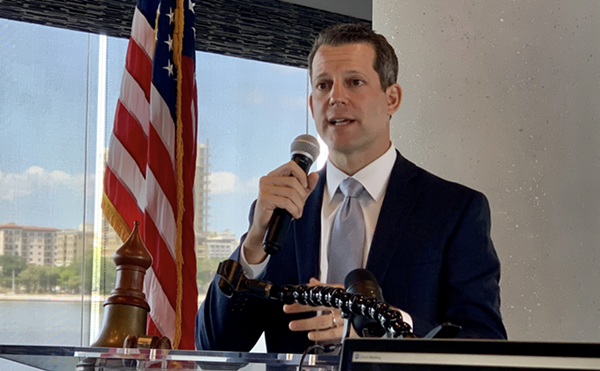In a 4-1 decision posted on Feb. 25, the Florida Supreme Court struck down a voter-approved one-cent transportation tax for Hillsborough County.
The “All For Transportation” tax went into effect on Jan. 1, 2019 and has collected more than $472 million. The funds have sat in escrow, unused in the wake of a lawsuit challenging the tax and filed two years ago by Hillsborough County Commissioner Stacy White; the court’s 25-page opinion does not say what will happen to the money.
The tax passed in November 2018 when 57% of Hillsborough County voters approved a plan that would send 45% of the revenue to Hillsborough Area Regional Transit (HART) which could use the money to boost services. The rest of the county—along with the municipalities of Tampa, Plant City and Temple Terrace—would split the rest. Hillsborough’s Metropolitan Planning Organization would use 1% of the revenue for planning and oversight.
In an email to Creative Loafing Tampa Bay, a spokesperson for HART said that as of the end of January 2021, the surtax already collected/allocated to HART was at $214,092,920.21.
The Tampa Bay Business Journal points out that “The surtax would have impacted every community in Hillsborough County by raising $15.8 billion over 30 years to fix roads and provide much-need local funding for major projects [like] …the TECO Line Streetcar system extension and modernization project, bus rapid transit projects, a Cross Bay Ferry connection to MacDill Air Force Base... “
But language in the charter put restrictions on how the county and aforementioned municipalities could use the money to address transportation-related issues, and White’s lawsuit argued that the charter was unconstitutional and took power away from the County Commission.
A circuit judge upheld the tax in 2019, but White appealed, which led to last week’s decision where Justice Jorge Labarga was the lone dissenter. “Because it cannot reasonably be said that the voters would have approved the tax without the accompanying spending plan, we must strike the charter amendment in its entirety,” Justice Charles Canady wrote.
The All for Transportation group has 15 days to file for a rehearing, but at a March 1 board meeting, HART lawyer David Smith said it was unlikely that HART would ask the Florida Supreme Court to reconsider. Without an appeal, the court can start to work on issuing a mandate, which would make what’s going to happen to the collected funds a little more clear. Smith told the HART board that what happens to the money and Hillsborough’s 8.5% sales tax—the highest in the state—may end up being decided by a Hillsborough County Circuit Court judge.
Last week, Urban designer Joshua Frank told CL that the court’s decision is “a devastating blow to the residents of Hillsborough County, the City of Tampa, Plant City, and Temple Terrace’s public safety, transportation, and right to self-governance.”
Tyler Hudson, co-chairman of the group that backed the tax, All for Transportation, called the court decision “an unprecedented act of judicial activism,” adding that the ruling “is an insult to Hillsborough County voters that will worsen our transportation crisis."
“HART’s mission is to take people to places that enhance their lives. Despite today’s ruling, that mission does not change. HART remains committed to providing transportation options to thousands of Hillsborough County residents daily—alleviating traffic and providing a more environmentally-friendly commute," Carson Chambers, Director of Communications HART, wrote in an email to CL.
"HART’s challenge in our mission—funding—does not change. We continue to do more with less—as one of the most underfunded transit systems per capita in the country," Chambers added. "One thing that is clear, Hillsborough County voters showed overwhelming support for alternative transportation solutions. We look forward to working with our community partners to continue HART’s mission and keep Hillsborough County moving.”
Frank, who is the principal at the Wide Open Office firm, said the court’s decision is another example of how Tallahasse continues to “preempt and undo any attempt at collaborative, community Democracy and further illustrate their distance from understanding our local needs.”
“I call on all our local leaders and elected officials to once again shoulder the heavy burden of another attempt to make good on the promise made to those who voted for bringing transportation safety and greater connectivity to Hillsborough County and add the tax to the ballot in 2022,” Frank added.
After the ruling, White called collection of the tax “reckless” and said he would not support any new referendum that comes before the county commission. But leaders committed to finding transit solutions are soldiering on.
“While the court overturned one solution, they didn’t overturn all of the solutions to this problem and they certainly didn’t overturn the problem itself,” Hudson told the HART board on Monday. All For Transportation noted the wide margin—58% of the vote and 77,000 petitions gathered—by which voters called for a tax increase in the name of improving transit and said it agreed with Hudson, who added that, “Never before have the people who live here and the people who are elected here have been so aligned on what it’s going to take to fix our Transportation situation.”
Tampa City Council chairman Luis Viera told the Tampa Bay Times the ruling was “a terrible blow for our community to be able to have self-determination involving transportation and mass transit,” and said he would ask city council to work with the County Commission to get a new referendum on the ballot.
All For Transportation co-founder Christina Barker told the Times that the Supreme Court basically said “citizens cannot say how they want their tax dollars spent, that that is purely in the realm and power of the County Commission,” so her group is calling on the commission to “put back on, really, the exact same plan that voters voted on and passed in 2018.”
UPDATED: 03/01/21 5 p.m. Updated for print with new comments by Hudson, White and others.
Support local journalism in these crazy days. Our small but mighty team is working tirelessly to bring you up to the minute news on how Coronavirus is affecting Tampa and surrounding areas. Please consider making a one time or monthly donation to help support our staff. Every little bit helps.
Subscribe to our newsletter and follow @cl_tampabay on Twitter.



















